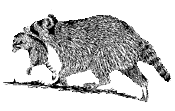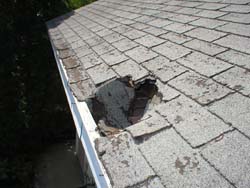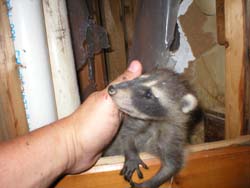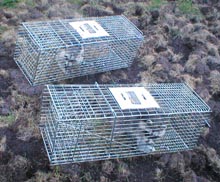|
|
RACCOON
REMOVAL
Raccoon
Biology
Minnesota Raccoons are true omnivores (they eat both meat and veggies).
 They weight between 11 and 35# and are 24-37” long. Raccoons
mate in
February through March, with a gestation period of 63 days. Averages of
2-6are born. The young remain with the female until fall and may den
with her through the winter. The female will use the same denning site
year afteryear. Raccoons are nocturnal. They weight between 11 and 35# and are 24-37” long. Raccoons
mate in
February through March, with a gestation period of 63 days. Averages of
2-6are born. The young remain with the female until fall and may den
with her through the winter. The female will use the same denning site
year afteryear. Raccoons are nocturnal.
Symptoms
You will hear heavy noises in the attic that move early evening and
early mornings. When the young are born you will hear bird chirps early
evening early mornings. You will hear the same noises in your chimney
if your chimney is un-capped. You will see at least a 4” hole
in your
roof or you will see one of your roof vents damaged. You will have
soffit panels that are bent or destroyed. You will see your lawn rolled
up or it looks like a roto-tiller has been through your lawn
Removal
The removal all starts with a service charge, we will come out and
access the damage, identify the specie doing the damage. Then we will
set the appropriate traps to remove the animals. We will also recommend
exclusions available for your site. And give you a cost to repair the
damage. If the raccoon does have young it will be live captured and
relocated with her babies.
Exclusions
Exclusions are a must with raccoons, even with the problem raccoon
removed other raccoons will smell that this has been a denning site and
force their way in. If a raccoon wants to get into your house it will.
Health
Concerns
Raccoons can carry both canine and feline distemper. Distemper is a
common disease and is usually fatal. Raccoons with distemper act tame
or confused, and eventually lose coordination, become unconscious and
die. Distemper cannot be transmitted to humans or immunized pets.
 Every
year Minnesota
raccoons are tested positive for the rabies virus,
This rabies virus is usually from another animal (bat, skunk, fox or
coyote), the raccoon strain of rabies is working its way across the
country and is currently documented in Michigan and Indiana but
isn’t
in Minnesota yet. Every
year Minnesota
raccoons are tested positive for the rabies virus,
This rabies virus is usually from another animal (bat, skunk, fox or
coyote), the raccoon strain of rabies is working its way across the
country and is currently documented in Michigan and Indiana but
isn’t
in Minnesota yet.
Raccoon roundworm infects most raccoons at some time in their lives.
The roundworm rarely causes the raccoon any problems, but the animals
pass large numbers of eggs to the environment through its feces. Eggs
ingested by another animal may hatch and cause nerve damage. Cases of
human infection have been documented, including two fatal cases caused
by accidental infections from captive raccoons.
|

